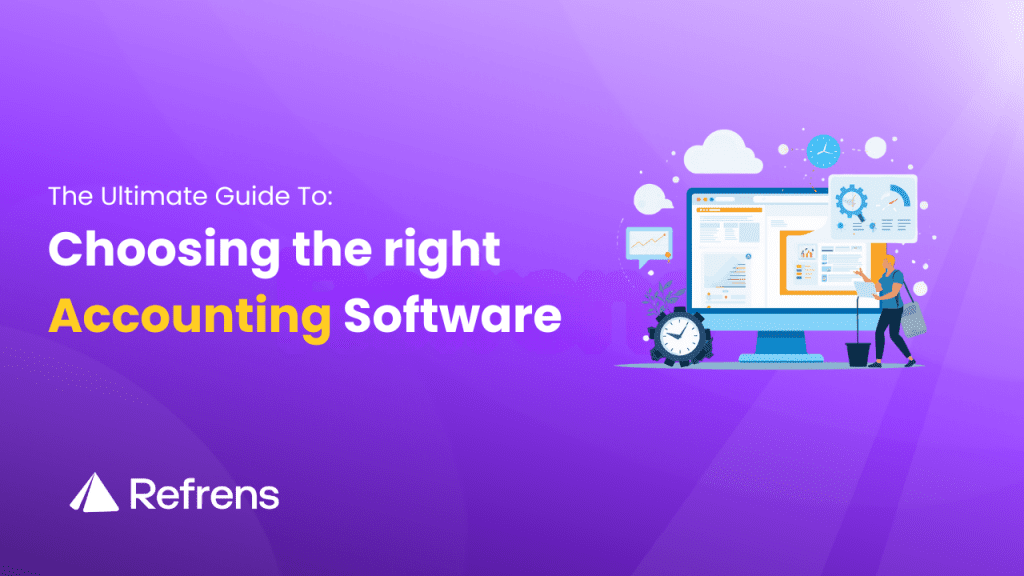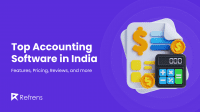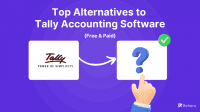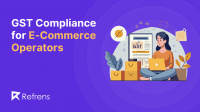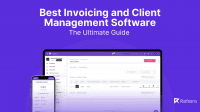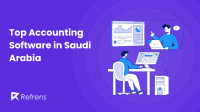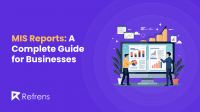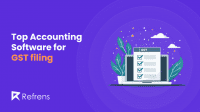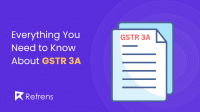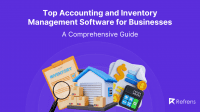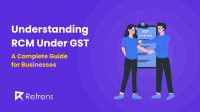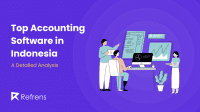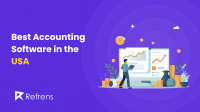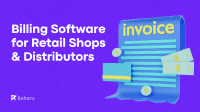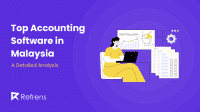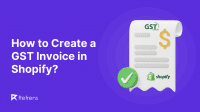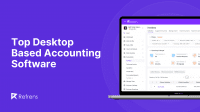Choosing the best accounting software can be overwhelming, especially with a myriad of options available. You’ll find a long list of features on company websites, brochures, and pamphlets that may or may not suit your business.
Hence, we talked to hundreds of accountants, CAs, and business owners to create this comprehensive guide that will help you make the right decision for your business.
Why is Accounting Software important for your business?
First, let’s make sure that we agree on why we need accounting software in the first place.
- Data Accuracy: Traditional accounting methods require manual data entry, which is time-consuming and error-prone. In contrast, accounting software automates data updates, reducing human error and ensuring accurate, reliable financial records. This automation enhances overall efficiency.
- Saves Time and money: Accounting software automates updates, reminders, and payment processing, saving time and reducing costs. It streamlines financial management, allowing focus on essential activities.
- Security: Data security is crucial for sensitive information. Accounting software provides high-end encryption and cloud storage, protecting against unauthorized access, loss, and physical storage failures.
- Real-time Updates: Accounting software provides real-time visibility with continuous updates, intuitive dashboards, and integration with other systems, ensuring access to the latest financial data for informed decision-making and efficient resource allocation.
- Integration with multiple applications: Accounting software integrates with various apps to streamline operations and improve data accuracy. This reduces manual entry and errors, providing quick access to accurate financial information for better decision-making.
Types Of Accounting Software:
There are different type of accounting software in the market.
- Spreadsheets
Spreadsheet accounting software uses tools like Excel or Google Sheets for manual data entry and tracking. It’s flexible and customizable, requires significant manual work, and is prone to errors.
Suitable for: It is suitable for small businesses with simple accounting needs but lacks automation and advanced features.
- Commercial Accounting Software
Commercial accounting software is designed for businesses to manage their financial operations efficiently. It offers features such as automated bookkeeping, invoicing, payroll, and financial reporting.
This type of software often includes advanced capabilities like inventory management, budgeting, tax preparation, and multi-currency support. It helps streamline processes, reduce manual errors, and provide real-time financial insights, making it ideal for businesses of all sizes seeking comprehensive accounting solutions.
2.1) Cloud Accounting Software (best suited for modern businesses):
Cloud accounting software is a web-based solution that allows businesses to manage their finances online. It offers real-time data access from any device with an internet connection, enabling collaboration and remote work, an essential feature for companies looking to hire remote software developers.
Features typically include automated updates, secure data storage, and integration with other business tools. The software ensures data security with encryption and regular backups. It’s ideal for businesses of all sizes seeking flexibility, scalability, and up-to-date financial information.
Suitable for: MSMBs, modern businesses who need to take load out of their accounting workflow.
2.2) Offline Accounting Software for PCs:
Offline accounting software for PCs is a desktop-based solution that operates without an internet connection, allowing businesses to manage financial transactions and bookkeeping locally. It stores data on the PC, providing a secure environment ideal for businesses with limited internet access.
Suitable for: Companies with low internet connectivity and extremely confidential data, like government records, etc.
- Enterprise Resource Planning Software:
Enterprise Resource Planning (ERP) software integrates various business functions, including accounting, supply chain management, human resources, and customer relationship management, into a single unified system. It provides real-time data and analytics, improving decision-making and operational efficiency.
ERPs streamline workflows by automating processes and ensuring consistent data across departments. Implementing an ERP often requires collaboration with a specialized software development company to ensure seamless integration and customization.
Suitable for: Large enterprises looking for seamless coordination and control over their diverse business activities
- Custom Accounting Software:
Custom accounting software is tailored to meet the specific needs of a business. It is developed to include unique features and workflows that standard accounting software or open source accounting software might not offer, ensuring a perfect fit for the company’s operations.
This type of software can integrate with other specialized systems used by the business, providing a cohesive and efficient financial management solution.
Suitable for: Businesses with unique requirements that off-the-shelf or open source solutions cannot adequately address.
What Features to Look for While Choosing an Accounting Software?
A) Features for your basic needs
These are the bare-minimum features that should be provided by your accounting software for smooth operations.
| Sr.no. | Feature | Explnation | Author’s Remarks |
| 1 | Invoicing & Billing | Create professional GST-compliant invoices with custom templates. | Ideally, your accounting software should handle invoicing as well. |
| 2 | Expense Tracking | Auto-record and categorize expenses. | Reduces workload on the finance team. |
| 3 | Financial Reports | Generate reports to track business financials, receivables & payables (eg, P&L statement, Balance Sheet, Client Statement, Payment Reports, Client/Vendor Ageing Reports, etc.) | Vital for assessing business health and making informed financial decisions. |
| 4 | Inventory Management | Track stock levels, manage product movements, and get real-time updates on inventory across multiple locations | Essential for businesses that deal with physical goods and need to track stock levels accurately. |
| 5 | Bank Reconciliation | Automatically match bank statements with recorded entries | Saves time during monthly reconciliations and reduces errors. |
| 6 | Payment Gateway Integration | Integration with payment gateways to enable online payment collection and streamline cash flow management | Simplifies receiving payments from clients and reduces manual entry of transactions. |
| 7 | Cloud Backup | Cloud-based backup to secure data against local failures | Ensures data is never lost and is accessible from anywhere. |
| 8 | Easy Data Sharing with CAs | Seamlessly export financial reports and data in formats that your CA can use with ease | Saves you from the filing season hassle |
| 9 | Credit Note & Refund Management | Generate credit notes and process refunds easily | Helps maintain proper records for returned goods or services. |
| 10 | Team Collaboration | Adding your team members to your business with customised roles and permissions. | Makes collaboration 10X easier and saves hours of to & fro. |
| 11 | Mobile Access | Access accounting features on mobile apps for real-time updates | Have all your business information at your fingertips, wherever you go. |
| 12 | Multi-Currency Support | Manage transactions in multiple currencies | Ideal for businesses with international clients or suppliers. |
| 13 | AI | Provides in-depth insights into your business and speeds decision making. | Too early to call AI a basic need, but your software should at least be working towards it. |
B) Features For Automation & Customisation
Taking things up a notch, these features ensure your documents highlight your brand, and saves your time.
| Sr. No | Feature | Explnation | Remarks |
|---|---|---|---|
| 1 | 1-click Document Sharing | Share invoices and reports via WhatsApp & email | Speeds up communication with clients and vendors. |
| 2 | Payment Reminders | Send automated reminders for bills and payments | Ensures timely payments. |
| 3 | Customizable Templates | Personalize invoices and reports to match your branding | Adds professionalism to all documents. |
| 4 | Recurring Billing | Automate recurring invoices for subscriptions and memberships | Saves time and ensures consistency with regular clients. |
| 5 | Bulk Data Migration | Import/export large data (sales, invoices, inventory) into/out of the system | Ideal for businesses transitioning or sharing data across departments. |
| 6 | Automated Bookkeeping | Create journal entries automatically for invoices and expenses | Keeps books updated without manual work |
| 7 | Automate Inventory Updates | Automatically update or block stock levels when creating invoices or documents | Saves time by managing inventory without manual input. |
| 8 | Insightful Dashboards | View sales, expenses, cash flow, and profits in real-time in one go | Quickly assess financial health for informed decisions. |
| 9 | Early Payment Discounts | Offer discounts to clients for early payments | Encourages faster payments and improves cash flow. |
C) Features For Govt. Compliance
Keeping you compliant with the government’s rules and regulations is as much the responsibility of your accounting software as it is of your finance team/accountant.
| Sr. No | Feature | Explnation | Remarks |
|---|---|---|---|
| 1 | E-Invoice Generation | Automatic generation of GST-compliant e-invoices, including IRN and QR code | Mandatory for businesses with a turnover above ₹5 crore. |
| 2 | E-Way Bill Generation | Generate e-Way Bills for the transportation of goods as required under GST | Required for the movement of goods worth over ₹50,000 (varies state-wise) |
| 3 | GST Return Filing (GSTR-1, 2B, 3B) | Helps generate GST returns (GSTR-1, 2B, 3B) for easy filing and tax compliance | Mandatory for every registered business |
| 4 | TDS Summaries | Generate TDS reports for submission to the government | Useful for businesses that make tax-deductible payments. |
| 5 | Automated GST Verification | Instantly verify client GST details such as GST Number, GST Status, Legal Name, Tax Type, Business Address, and PIN with the built-in GST Lookup feature | Checks the authenticity of your clients/vendors, saves time & avoids errors. |
| 6 | Audit Reports | Automatically generate reports necessary for government audits | Important for maintaining tax filing integrity. |
D) Features For Your Accounting & Bookkeeping Team
These features are a must for your accounting and bookkeeping team.
| Sr. No | Feature | Explnation | Remarks |
|---|---|---|---|
| 1 | Trial Balance | Generate trial balance reports to ensure accounting books are balanced | Most helpful when this can be generated automatically in real time |
| 2 | Journal Entries | Record and manage journal entries for all transactions | Look for software that automatically passes journal entries to save time and avoid discrepancies |
| 3 | Tax Calculation & Filing | Automatically calculate tax liabilities and file returns | Saves accountants’ time during tax season and ensures accuracy. |
| 4 | Bank Integration | Integrates with bank accounts to pull in transaction data for easy reconciliation | Saves time and prevents manual errors in reconciliation |
| 5 | Cost Center Management | Track and categorize expenses or income per department or business segment | Vital for large organizations with multiple departments |
E) Features For Supporting Your Growth
Once you’ve got the basic setup done, you need to make sure your accounting software can accommodate your growth as well.
| Sr. No | Feature | Explnation | Remarks |
|---|---|---|---|
| 1 | Multi-User & Multi-Location Access | Allow users to access the system across multiple branches or offices | Essential for businesses with multiple locations or teams |
| 2 | Custom User Roles & Permissions | Customize roles and permissions to suit a growing team | Ensures appropriate access for team members |
| 3 | Integration with CRM & Payroll | Integrate with CRM and payroll systems | Helps manage all aspects of your business from a single tool. |
| 4 | Advanced Reporting | Create custom financial reports tailored to your business needs | Enables better decision-making as the business scales |
| 5 | Approval Workflow | Implement a multi-step approval process for key actions (e.g., invoice creation, expense approvals) | Reduces errors and fraud with multiple checks |
| 6 | API Access | Integrate the accounting system with your website/app & other business tools (e.g., Shopify, Pabbly Connect, other third-party platforms) | Helps automate your invoicing for multiple platforms & streamline business operations |
| 7 | Vendor KYC (PAN/Bank) Verification | Verify vendor PAN & bank details with official records. | Get an automated match score for quick decision-making. Ensures vendor authenticity |
| 8 | Automated Financial Forecasting | AI-based forecasting for future revenues and expenses based on historical data | Helps businesses plan and allocate resources efficiently. |
| 9 | RFI (Request For Invoice) Links | Create custom RFI links and share them with Vendors. | Ensures a unified Invoice format and reduces unnecessary back-and-forth. |
F) Features For Data Security & Privacy
These features ensure your data is safe and secure.
| Sr. No | Feature | Explnation | Remarks |
|---|---|---|---|
| 1 | Two-Factor Authentication (2FA) | Added a layer of security for accessing your accounting software | Protects your financial data from unauthorized access. |
| 2 | Cloud Backup | Automatic cloud backup to ensure data recovery in case of system failure | To prevent data loss due to hardware failure. |
| 3 | ISO Certification | Ensure your software is compliant with international data security standards | Shows that the software is serious about protecting your data. |
| 4 | User Role Management | Control access levels for team members (e.g., admin, viewer, editor) | Helps keep sensitive data safe by limiting access. |
| 5 | Audit Logs | Track user actions within the system for security and compliance purposes | Important for understanding who made what changes and when. |
| 6 | Encryption | Encrypt sensitive data both in transit and at rest | Ensures confidentiality of business financial information. |
Key Considerations When Purchasing Accounting Software
1. Business Size: When selecting accounting software, consider the size of your business—whether it’s small, medium, or large. Many software options are tailored specifically for different business sizes, offering features and functionalities suited to each.
If your business requires basic accounting features, opt for simpler software. However, if you need more advanced customization and extensive features, choose software designed for larger or more complex businesses. Always align your choice with your specific business needs to ensure the best fit.
2. Cost: Cost is a crucial factor when choosing accounting software. Prices vary widely, from free plans to those costing thousands of rupees as features become more advanced. Start by determining your organization’s budget, then select accounting software that fits within that budget while meeting your needs. Balancing cost with the necessary features ensures you get the best value without overspending.
3. Ease of use: It’s important to choose accounting software that is easy to use and has intuitive features. The software should simplify your tasks, not complicate them. Look for a solution that is user-friendly and understandable, ensuring that it streamlines your work processes effectively. Choose wisely to ensure the software meets your ease-of-use requirements.
4. Integration Capabilities: Select accounting software that can easily integrate with other tools. As your business grows, you might need advanced features and additional functionalities. Ensuring your software can seamlessly connect with various tools will help you scale and adapt to future needs without hassle. Choose a solution that supports integration to keep your operations smooth and efficient.
5. Security: Security should be a top priority when choosing accounting software, as you handle sensitive client data. Ensuring this data is protected and secure is crucial. Look for software that offers robust security measures to safeguard your information, making it a key consideration in your decision-making process.
6. Customer Support: Accounting software can sometimes be complicated for you and your staff. Therefore, the software provider must offer excellent customer support whenever needed. Reliable customer service ensures that any issues or questions can be addressed promptly, making your experience smoother and more efficient.
7. Reviews and Reputation: When choosing accounting software, thoroughly research the software company and prioritize those with good reviews and a strong market reputation. Opt for well-known brands that are trusted for their quality, as cheap rates often don’t guarantee reliable service. A reputable software provider ensures you receive both quality and dependable support.
Choosing the right software can still get overwhelming. That’s why we have a team of experts who have helped 100s of businesses find the accounting software that is most apt for them, for FREE.
Reach out to us at +91 9104043036 OR care@refrens.com for a free consultation.
Conclusion
In today’s fast-paced business environment, selecting the right accounting software is more important than ever. It not only streamlines financial operations but also enhances data accuracy, security, and efficiency, enabling better decision-making and resource management.
By considering the size of your business, cost, ease of use, integration capabilities, security, customer support, and reputation of the software provider, you can choose a solution that best fits your needs. Whether you opt for a well-known brand or a tailored custom solution, the right accounting software will be a valuable asset in driving your business’s growth and stability.
Make your choice wisely and enjoy the numerous benefits of an optimized financial management system.
Frequently Asked Questions (FAQs)
- Which is the best Accounting Software?
There is no universally best accounting software. The best one for your firm meets your specific needs and ensures a smooth accounting experience. Different businesses require different features. Refrens, an AI accounting software, for instance, is a strong option with its AI automation features designed to simplify your accounting processes. It’s certainly worth considering for a trial.
- What accounting software do large companies use?
Every business has unique needs, so there’s no single software that suits all large companies. However, some recommended options include Refrens, Zoho Books, Microsoft Dynamics 365, and SAP S/4HANA. These are worth considering for their robust features and capabilities.
- What accounting software do accountants use?
Several accounting software options are popular among accountants, such as Refrens, Zoho Books, Sage Partner, and Xero.
- How much does accounting software cost?
The cost of accounting software can vary significantly based on the features and services provided. Different software options cater to diverse business needs, offering a range of prices to fit various budgets.
Below are the price ranges for some popular accounting software choices:
| Softwares | Price Range |
| Refrens | ₹3,900 to ₹8500, Yearly |
| Zoho Books | ₹749 to ₹7,999, Yearly |
| Tally | ₹9000 to ₹27,000, Yearly |
| Vyapar | ₹3,399 to ₹3,999, Yearly |
| Busy | ₹9,999 to ₹19,999, Yearly |
- What is customized accounting software?
Customized accounting software is specially designed to meet the unique needs of your business, providing tailored features and functionalities. This ensures a perfect fit for your specific accounting processes and requirements.
- What is Prepackaged/Ready to use accounting software?
Prepackaged accounting software is a ready-made solution with standard features that can be used by many businesses. It doesn’t need any customization and can be quickly set up and used.
- What is the easiest accounting software for a small business?
There are a few options available, such as Refrens, Zoho Books, and Vyapar.
We cover all the topics that will help founders, business owners (and accountants) choose the right software for their businesses.
- 15 Best Invoicing Software In 2024
- E-invoicing In GST: A Complete Guide
- Top E-Invoicing Software in India: Detailed Analysis
- Top 10 Inventory Invoice Software
- Best CRM Software with Invoicing
- Top 8 e-Way Bill Software Top 7 Invoice Generator Software
- Top Desktop Based Accounting Software
- Top Accounts Receivable Accounting Software
- The Ultimate Guide to the Best Invoicing and Client Management Software

